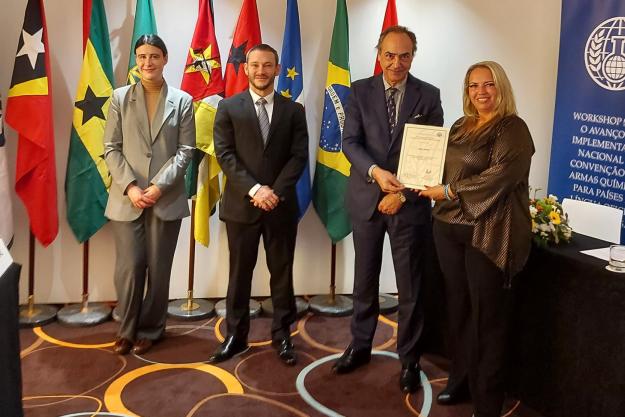
Maria Andrade, Legal Consultant at OPCW, Rene Betancourt, Senior Programme Officer at OPCW, H.E. Ambassador Afonso Malheiro, President of the Portuguese National Authority, and Sandria Saraiva, National Authority Permanent Secretary attend the OPCW workshop in Lisbon on national implementation of the CWC.
THE HAGUE, Netherlands—27 March 2024— The Organisation for the Prohibition of Chemical Weapons (OPCW), in collaboration with the Government of Portugal, organised a workshop on advancing the national implementation of the Chemical Weapons Convention (CWC) in Portuguese-speaking Member States, from 27 to 29 February 2024 in Lisbon, Portugal.
The main objective of the event was to support the implementation of OPCW’s policy-making organs’ recommendations, with a special focus on providing tailored and systematic technical assistance to address the practical national implementation issues and concerns of States Parties to the Convention. This event marked a significant milestone as it brought together all the Lusophone Member States for the first time in OPCW history, conducting proceedings entirely in Portuguese, and centered around CWC implementation. The workshop succeeded in enhancing communication among participants and fostering stronger cooperation among Member States.
The three-day event gave experts the opportunity to exchange information, identify common challenges and share best practices related to the national implementation of the Convention. It emphasised the importance of promoting the national implementation of the CWC, and the advantages of attaining comprehensive legislation in this regard. The workshop included briefings on best practices regarding national strategies on advancing CWC legislations, as well as rights and obligations of States Parties under the Convention, placing an emphasis on assisting in the review, drafting, and advancement of comprehensive implementing legislation.
In addition, the event included presentations delivered by experts from international organisations, including the Community of Portuguese Language Countries (CPLP) and World Customs Organization (WCO). The workshop featured dynamic activities focused on the review legislative texts and comprised practical exercises addressing common misconceptions about chemical weapons and CWC related issues.
The event was attended by 19 delegates from eight Portuguese-Speaking countries: Angola, Brazil, Cabo Verde, Guinea–Bissau, Mozambique, Portugal, São Tomé and Príncipe and Timor–Leste.
Background
Article VII covers national implementation of the Convention and requires each State Party to enact implementing legislation at the national level. Comprehensive legislation at the national level is essential for preventing the re-emergence of chemical weapons.
In 2023, 161 States Parties to the Convention have reported the adoption of national implementing legislation, of which 128 have legislation covering all the initial measures. Thirty-three States Parties have legislation covering some of the initial measures, while 32 States Parties have yet to adopt legislation and/or submit the information to the Secretariat. In comparison, in 2018, there were 38 States Parties which had yet to adopt legislation and/or submit the information to the Secretariat.
As the implementing body for the Chemical Weapons Convention, the OPCW, with its 193 Member States, oversees the global endeavour to permanently eliminate chemical weapons. Since the Convention’s entry into force in 1997, it is the most successful disarmament treaty eliminating an entire class of weapons of mass destruction.
In 2023, the OPCW verified that all chemical weapons stockpiles declared by the 193 States Parties to the Chemical Weapons Convention since 1997 — totalling 72,304 metric tonnes of chemical agents — were irreversibly destroyed under the OPCW’s strict verification regime.
For its extensive efforts in eliminating chemical weapons, the OPCW received the 2013 Nobel Peace Prize.
